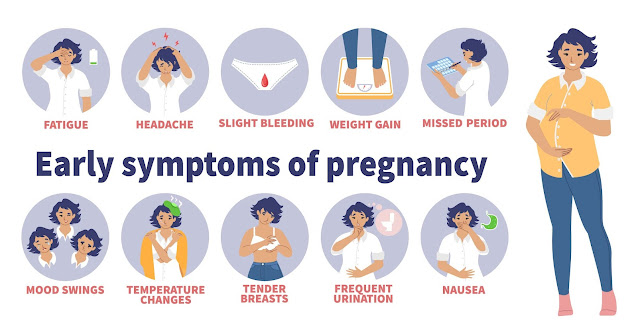Maternal health is complicated, influenced by a variety of genetic, socioeconomic, and environmental factors, as well as infections and environmental conditions, many of which might impair foetal growth. Physiological adaptations occur in better nutritional use through enhanced absorption, lower excretion, or metabolic changes.
Early signs of pregnancy
- Missed period
- Weight gain
- Fatigue and Tiredness
- Tender Breasts
- Dizziness
- Feeling Emotional
- Increased sensitivity to smell
- Nausea and Vomiting
- Cramping
- Bloating
- Frequent Urination
- Heart Burn
- Constipation
- Mood swings
Other symptoms:
- Hormonal changes and a reduction in blood flow to the brain induce headaches.
- Early in the first trimester, there's a sticky, whitish or pale yellow discharge.
- From several weeks after conception, the body temperature was elevated.
- In the early stages of back discomfort, poor sleeping habits are to blame.
- As a result of nausea and vomiting, hunger changes.
Early pregnancy care:
- Drink lots of water
- Regular exercise
- Take care of your mental health
- Check your weight
- Eat a diet rich in fruits and vegetables, protein and fat
Foods To Be Avoided
- Raw or undercooked meat
- Subcooled ready meals
- Certain types of fish
- Foods high in sugar
- Street food
- Cheese
- The liver and other foods contain vitamin A
- raw eggs or undercooked eggs
- Alcohol and caffeine
- Unpasteurized milk or raw milk.
- Unwashed fruits and vegetables
Fruits to be avoided
- Papaya
- Pineapple
- Peach
- Grenade
- Wild cherry
- Sprouted potato
- Sesame seeds mixed with honey
Summary
Many of these signs and symptoms, unfortunately, are not specific to pregnancy. Some of them can signal that you are likely to get sick or that your period is about to start. Likewise, you can be pregnant and not have many of these symptoms. However, if you haven't had your period for a while and have some of the above signs and symptoms, take a home pregnancy test or see your doctor. Make an appointment with your healthcare professional if your home pregnancy test is positive. The sooner you have confirmation of your pregnancy, the sooner you can start antenatal care.

Comments
Post a Comment